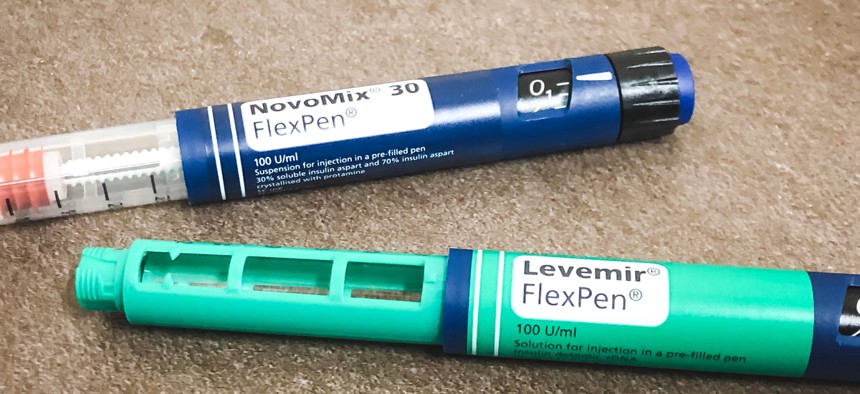More States Considering a Cap on Insulin Costs

The average monthly cost of insulin between 2012 and 2016 rose from around $238 to $475, despite no changes being made to the drug. Shutterstock
A new bill in Washington is similar to legislation passed in Colorado last year.
Over the past decade, the price of insulin tripled. For all of the 1.25 million Americans born with type 1 diabetes—and some of the millions who develop type 2 diabetes as adults—insulin is crucial to survival, but the rising costs are putting the drug outside the range of affordability for many.
A state lawmaker in Washington wants to cap the out-of-pocket costs many patients pay for insulin to $100 per month, saying she hopes this would prevent residents from rationing their use of the life-saving drug. “This is a crisis,” state Sen. Karen Keiser said in a statement announcing the bill. “My colleagues and I hear every day from constituents who can’t afford their medication anymore, people who have to choose between prescriptions and rent.”
Under the bill, a health insurance plan issued on or after January 1, 2021 that provides coverage for insulin must cap the copays, deductibles “and other forms of cost sharing” for the drug to $100 per 30-day supply. This would reduce costs for many, as the average monthly cost of insulin between 2012 and 2016 rose from around $238 to $475, despite no changes being made to the drug.
“The legislature finds that diabetes imposes a significant health risk and tremendous financial burden on the citizens and government of the state of Washington, and that access to the medically accepted standards of care for diabetes, its treatment and supplies, and self management training and education is crucial to prevent or delay the short and long-term complications of diabetes and its attendant costs,” the bill reads.
The text of the bill is similar to one that was passed into law in Colorado last year, which made the state the first to cap insulin prices at $100 per month. In signing the bill, Gov. Jared Polis announced that “the days of insulin price-gouging are over in Colorado.”
Colorado lawmakers said they received inquiries from state lawmakers across the country after the bill was passed. Pennsylvania lawmakers introduced a bill to cap insulin in September 2019, but the bill has not left committee. Illinois lawmakers passed a similar measure in November 2019, which Gov. J.B. Pritzker said he would sign but has not yet.
Critics of initiatives to cap insulin prices have expressed fear that pushing the cost of the drug onto insurers will raise rates. Early results out of Colorado, however, suggest that hasn’t happened. In its filings for proposed 2020 rates for individual and small-group market plans Kaiser Permanente wrote that “it is expected that the cost sharing caps will have a de minimus (negligible) impact on rates.”
Other critics have complained that the laws aren’t broad enough. In Colorado and Illinois, the laws only cover people with private health insurance, such as those who buy their own plans or some who get coverage through employers, but excludes those with Medicare and Medicaid and people covered by employer-funded insurance that is federally regulated.
In comments on the Colorado Division of Insurance’s proposed rules for implementing the law in Colorado, the diabetes charity T1International that the law “does not sufficiently cover all people with diabetes or using insulin.”
In Illinois, it was estimated that the law, if signed by the governor and put into effect on January 1, 2021, would only regulate costs for 260,000 insulin users, or about 20% of the state’s 1.3 million users. The bill’s sponsor, state Rep. Will Guzzardi, said in a Facebook video posted after the bill’s passage that it wasn’t a one-size-fits-all solution. “It’s not going to fix the whole problem,” he said. “Certain people won’t be covered, certain people will. But for those who will be covered it’s going to be a big step forward to make sure they’ll be able to afford the lifesaving medicine that they need.”
Some insurance companies have begun to voluntarily cap the price of insulin. The nonprofit health plan UCare in Minnesota announced that, starting in 2020, insulin costs would have a ceiling of $25 per month for their 33,000 plan holders, making them the second insurance company in the state to do so. The health insurance company Cigna also created a plan in 2019 that would cap the monthly cost of insulin at $25 for the roughly 700,000 eligible to enroll in a non-government-funded pharmacy plan managed by Express Scripts.
But state lawmakers like Keiser in Washington say legislative action is needed now. “We have a responsibility to curb excessive costs of critical prescription drugs that are vital for people’s health,” she said.
Emma Coleman is the assistant editor for Route Fifty.

NEXT STORY: A Proposal to Protect Referees From Angry Parents






